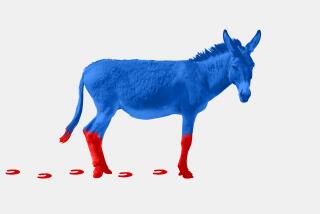U.S. Accused of Trying to Buy Election : Nicaragua: The Administration insists that the $9 million it seeks for the opposition party is needed to offset the well-financed Sandinistas.
- Share via
WASHINGTON — President Bush’s plan to pump $9 million into Nicaragua to assist the opposition party over the next four months is giving rise to charges that the United States wants to buy the Feb. 25 election in the Central American nation.
Bush Administration officials have insisted that U.S. assistance is necessary because the well-financed Sandinista regime is making it virtually impossible for the impoverished National Opposition Union (UNO), led by presidential candidate Violeta Barrios de Chamorro, to communicate with Nicaraguan voters.
But opponents of the Bush assistance package, including conservative Sen. Jesse Helms (R-N.C.) as well as many liberal Democrats, argue that $9 million far exceeds the sum needed to guarantee a fair election, especially in a country where the annual per capital income is about $300.
The excess, according to these critics, is actually intended by the Bush Administration to be used as “walking around money” to buy votes for the opposition party in Nicaragua--a tactic that they predict will backfire on Chamorro.
“Do we really want Mrs. Chamorro to be known as the best candidate American money can buy?” asked Sen. Tom Harkin (D-Iowa), a leading critic of the proposal. “Do we really want free elections and fair elections in Nicaragua, or do we want an election bought and paid for by the United States government?”
Despite intense criticism, there are indications that Bush’s request will be approved by Congress this week--a sign of just how weary the critics of U.S. policy have grown after nearly a decade of quarreling over aid to the Contras.
The irony of the debate is that the aid package has been opposed primarily by liberals, who have long advocated a policy of encouraging democratic elections in Nicaragua, and it has been supported mostly by conservatives, who previously sought a military solution to the civil war.
Also, many of the Republicans pressing for the President’s request strongly oppose financing elections in the United States with federal money.
The Administration’s proposed package, which was sent to Congress last month, calls for $5 million to fund “internal groups,” understood to be UNO and its allied parties. The remaining money would be given to outside organizations to spend in the Nicaraguan election, including $4 million for the National Endowment for Democracy, an organization set up to foster democracy abroad.
The proposal has moved quickly through Congress, largely because the Administration argued that it was needed to assist in registration of voters during October. The House passed it Oct. 4. Nevertheless, officials said that the money is unlikely to reach Nicaragua before November, even if the Senate acts favorably on it this week.
A supporter of the Administration’s package, Sen. John McCain (R-Ariz.), defended the proposal on grounds that the Sandinistas are “able to manipulate the electoral process far beyond the level that is tolerated in democratic societies.”
“They will offer food and jobs to the poor and starving victims of their chronic mismanagement of the Nicaraguan economy,” he predicted. “They will threaten Nicaraguans supporting the opposition. They will continue to dominate the media and to permit the opposition extremely limited access to television.”
Even many critics agree with the President that the United States should provide some assistance to guarantee a fair election, but they are suspicious that UNO leaders will use some of it for outright vote buying or for lavish living.
Harkin, recalling that former Nicaraguan dictator Anastasio Somoza was reputed to have bought votes for 30 cents each, said the proposed aid package--combined with $3.5 million already spent by the United States in Nicaragua this year--would amount to an expenditure of $5 per person in a country of 1.7 million registered voters.
He said it is the equivalent to spending $500 million for a campaign in the United States.
“If you want to buy an election,” Harkin said, “it could be done cheaper than this.”
Harkin was particularly critical of a budget drawn up by UNO that proposed to spend $600,000 for 20,000 poll watchers, or $30 a day; $140,000 for invitations to international observers; $50,000 for UNO leaders to travel abroad; $815,000 for salary and benefits of UNO leaders, and $1.3 million for automobiles, which he said could finance 2,241 rental cars at $20 a day,
“What kind of nonsense are we talking about, $1,345,000 for vehicles?” he asked.
Harkin and other liberals also maintain that the U.S. support will undermine Chamorro’s campaign by allowing the Sandinistas to portray her as the hand-picked candidate of the United States.
In response, Administration supporters emphasize that none of the money will be spent directly for UNO’s campaign. Instead, it is designated for such activities as party building, voter registration, training of poll workers, election monitoring, get-out-the-vote drives and international observers.
More to Read
Sign up for Essential California
The most important California stories and recommendations in your inbox every morning.
You may occasionally receive promotional content from the Los Angeles Times.












